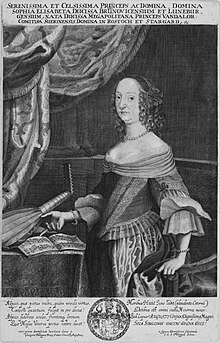Duchess Elisabeth Sophie of Mecklenburg
Elisabeth Sophie of Mecklenburg | |
|---|---|
 | |
| Born | 20 August 1613 Güstrow |
| Died | 12 July 1676 (aged 62) |
| Noble family | House of Mecklenburg |
| Spouse(s) | Augustus the Younger, Duke of Brunswick-Wolfenbüttel |
| Issue | Ferdinand Albert I Marie Elisabeth |
| Father | John Albert II, Duke of Mecklenburg |
| Mother | Margaret Elisabeth of Mecklenburg |
Elisabeth Sophie of Mecklenburg, Duchess of Brunswick-Lüneburg (20 August 1613 – 12 July 1676) was a German poet and composer.
Life
She began studying music at the court of her father, Duke John Albert II of Mecklenburg-Güstrow, where was an orchestra known for its use of fine English musicians, such as William Brade.[1] She moved to the court of Kassel, which also had a strong musical tradition, when the Thirty Years War threatened her court in 1628. In 1635, she married the learned Augustus the Younger, Duke of Brunswick-Lüneburg[1] with whom she had two children:
Elisabeth Sophie was charged with organizing the court orchestra, and at times worked closely with Heinrich Schütz, who was appointed absentes Kapellmeister in 1655. She may have collaborated with him on arias in his Theatralische neue Vorstellung von der Maria Magdalena.[1]
Most of Elisabeth Sophie 's compositions are hymns or devotional arias. Some of these were published in 1651 and 1667. The one printed in 1651, Vinetum evangelicum, Evangelischer Weinberg, is believed to have been the first music published by a woman in Germany.[2] She also played a major role in establishing large court entertainments, including masquerades, plays, and ballets, to which she at times wrote librettos and music. Her additional involvement in these entertainments is unclear. Two of her dramatic works survive: Friedens Sieg (1642, Brunswick) and Glückwünschende Freudensdarstellung (Lüneburg, 1652).[1]
Sibylle Ursula von Braunschweig-Lüneburg was her stepdaughter.[3]
Footnotes
- ^ a b c d See Walter, Sophie Elisabeth
- ^ See Tick, Western Classical
- ^ Hilary Brown (2012). Luise Gottsched the Translator. Camden House. pp. 23–. ISBN 978-1-57113-510-0.
References
- Walter, Horst (2001). "Sophie Elisabeth, Duchess of Brunswick-Lüneburg". In Sadie, Stanley; Tyrrell, John (eds.). The New Grove Dictionary of Music and Musicians (2nd ed.). London: Macmillan Publishers. ISBN 978-1-56159-239-5. (similar text in Grove Opera article by same author)
- Tick, Judith (2001). "Women in music, §II: Western classical traditions in Europe & the USA 3. 1500–1800.". In Sadie, Stanley; Tyrrell, John (eds.). The New Grove Dictionary of Music and Musicians (2nd ed.). London: Macmillan Publishers. ISBN 978-1-56159-239-5.
- 1613 births
- 1676 deaths
- German Baroque composers
- Duchesses of Brunswick-Lüneburg
- German classical composers
- German women poets
- German female composers
- Pupils of Heinrich Schütz
- 17th-century classical composers
- Female classical composers
- 17th-century German women writers
- 17th-century writers
- New House of Brunswick
